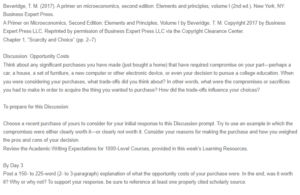Discussion – Opportunity Costs
Buying a home has been one of the main projects I have been saving for, and I was finally able to complete this project recently. One of the sacrifices I had to make was postponing my vacation over the festive season at the end of last year. I decided to channel the money I had saved for the vacation into buying a home to eliminate the monthly rent expense. Another compromise I made was using public transport to travel to work and renting out my car to save on fuel costs and earn an extra income to manage the cost of buying the house. The third compromise that I had to consider was limiting my miscellaneous expenses.
The trade-offs played a vital role in influencing my choices because I knew I was making sacrifices for a better cause. I understood that I had a responsibility to manage my finances properly and cut all non-mandatory expenses because after buying a house, I would not have to worry about rent anymore, and I would use the funds that were being used on rent to do the things I had set aside such as going for a vacation.
The trade-offs also helped me gain self-control over my spending habits. According to Peetz & Davydenko (2021), self-control plays an essential role in distancing oneself from anything that increases the temptation to spend. They also helped me prioritize effectively. According to Homburg et al. (2008), prioritization includes determining whether what an individual wants to acquire pays off and how it should be implemented. I developed a clear picture of what I wanted, what was necessary, and what I could postpone or do away with, thus ensuring that no money was misappropriated.
References
Homburg, C., Droll, M., & Totzek, D. (2008). Customer prioritization: Does it pay off, and how should it be implemented? Journal of Marketing, 72(5), 110-130. https://doi.org/10.1509/jmkg.72.5.110
Peetz, J., & Davydenko, M. (2021). Financial self-control strategy use: Generating personal strategies reduces spending more than learning expert strategies. Journal of Experimental Social Psychology, 97, 104189. https://doi.org/10.1016/j.jesp.2021.104189
ORDER A PLAGIARISM-FREE PAPER HERE
We’ll write everything from scratch
Question

Discussion – Opportunity Costs
Beveridge, T. M. (2017). A primer on microeconomics, second edition: Elements and principles, volume I (2nd ed.). New York, NY: Business Expert Press.
A Primer on Microeconomics, Second Edition: Elements and Principles, Volume I by Beveridge, T. M. Copyright 2017 by Business Expert Press LLC. Reprinted by permission of Business Expert Press LLC via the Copyright Clearance Center.
Chapter 1, “Scarcity and Choice” (pp. 2–7)
Discussion: Opportunity Costs
Think about any significant purchases you have made (just bought a home) that have required compromise on your part—perhaps a car, a house, a set of furniture, a new computer or other electronic device, or even your decision to pursue a college education. When you were considering your purchases, what trade-offs did you think about? In other words, what were the compromises or sacrifices you had to make in order to acquire the thing you wanted to purchase? How did the trade-offs influence your choices?
To prepare for this Discussion:
Choose a recent purchase of yours to consider for your initial response to this Discussion prompt. Try to use an example in which the compromises were either clearly worth it—or clearly not worth it. Consider your reasons for making the purchase and how you weighed the pros and cons of your decision.
Review the Academic Writing Expectations for 1000-Level Courses, provided in this week’s Learning Resources.
By Day 3
Post a 150- to 225-word (2- to 3-paragraph) explanation of what the opportunity costs of your purchase were. In the end, was it worth it? Why or why not? To support your response, be sure to reference at least one properly cited scholarly source.

